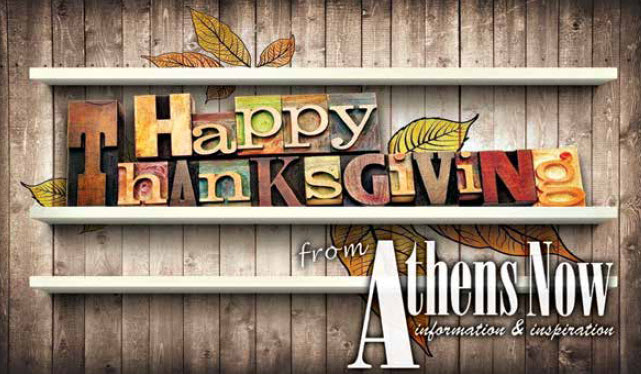Publisher’s Point: Gobsmackin’ Gratitude
 By: Ali Elizabeth Turner
By: Ali Elizabeth Turner
The word “gobsmack” is one of my favorites. Its etymology is a touch uncertain, but it seems to have arisen in the ‘80s, and is the combination of, wait for it, gob and smack. The idea of “gobs and gobs” has always meant “a lot,” and smack is what you do reflexively to your mouth or forehead when you are astonished. So, “gobsmack” is essentially being super-amazed, and the good news about what gratitude does to your brain and the rest of your health is truly gobsmacking.
If we can resist the siren song that Black Friday actually begins in July, or “don’t wait ‘til Black Friday, act like it now,” as if people getting killed over Cabbage Patch dolls is a worthy personal goal, and let Thanksgiving be Thanksgiving and not just the run up to a “Material Christmas,” it is now a scientifically proven fact that the chemical makeup of expressed gratitude actually changes your brain for the better. What’s more, America has a unique holiday that is set aside for just that purpose. I chafe at the use of the words “Turkey Day” as the description; ladies and gentlemen, it is Thanksgiving Day.

The original beauty and purity of the holiday has been under assault in recent years; kids dressing up in native American garb or pilgrim’s costumes to spiritually commemorate something as fragile as survival and life itself in the 1600s has been relegated to the “racist” rubbish heap, and perhaps we’ll tackle that another year. But for this edition of Athens Now, we are going to discover why cultivating gratitude might be one of the best things you can do for yourself and others.
So, what do “gobs and gobs” of gratitude do to your brain? It turns out, several things, but the chief one is that gratitude causes the release of dopamine, which is one of the “feel good” neurotransmitters, and humans cannot function without it. Without dopamine, we would literally be catatonic.
Gratitude helps with the battle against depression because it plays off the brain’s “confirmation bias.” That means that if you have cultivated a mindset that things are going to go well, and to see possibilities in the midst of undeniable difficulty, the brain looks for that to be the case and homes in on the good stuff. If you are of the general persuasion that life always gives you a raw deal, well, that is in fact what will happen because your brain and other factors will see to it.
Gratitude’s role with the release of dopamine helps with circulation, it helps provide better sleep (which is probably why writing down five things for which you are thankful just before you turn in may be as good as a sleeping pill without the better side effects), and opens you up spiritually. As believers we are commanded to “come into His gates with thanksgiving.” Why is that? Is God somehow insecure and needs you to come into His presence with some phony smile plastered on your face? Obviously not. But to wrestle past the truly difficult things that are in your life and insist on giving thanks in and for the difficulties puts you in the best possible place to change and be changed, starting with your brain. As that profound philosopher Willie Nelson said in a song, “When I started counting my blessings, my whole life turned around.”
Happy Thanksgiving
